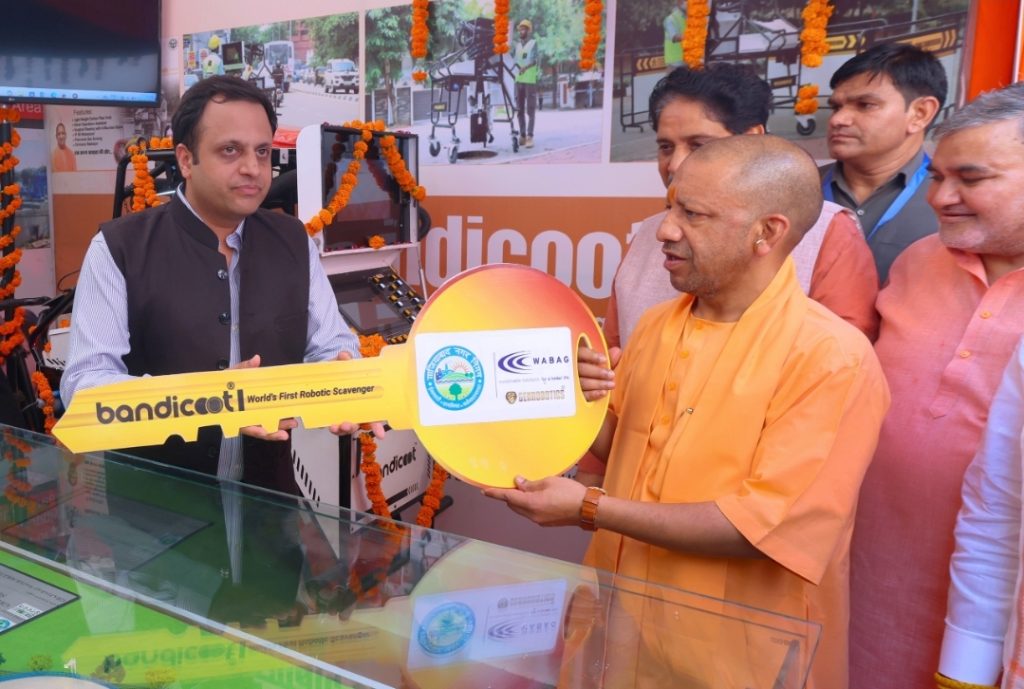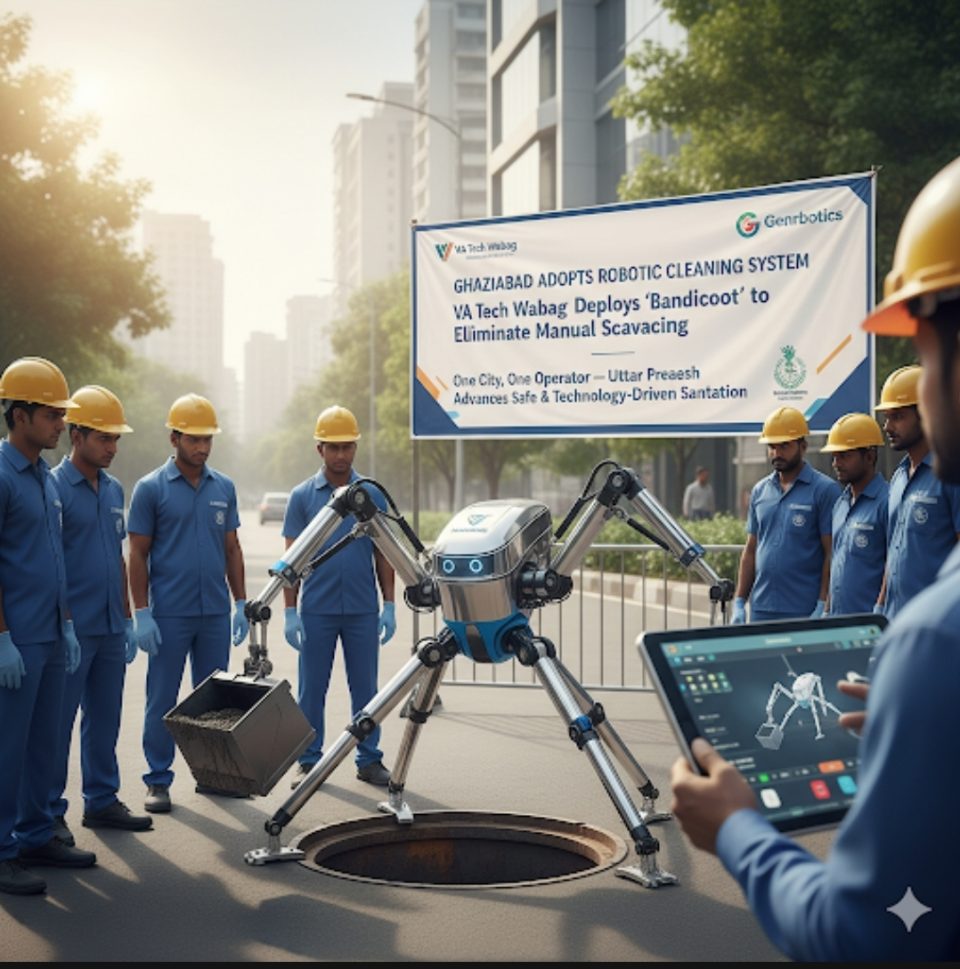Revolutionary Robotic Sanitation: How Ghaziabad’s Robotic Cleaning Initiative Transforms Customer Experience in Urban Infrastructure
Ghaziabad’s deployment of the Bandicoot robot represents more than technological advancement. Moreover, it signals a fundamental shift toward customer-centric Robotic sanitation services. Furthermore, this initiative demonstrates how advanced automation can revolutionize urban infrastructure maintenance while enhancing citizen experiences.
Robotic Sanitation: Technology Drives Service Excellence Through Innovation
The world’s first manhole-cleaning robot fundamentally transforms customer interactions with municipal services. Additionally, Bandicoot’s advanced features create unprecedented service quality standards. Consequently, residents experience more reliable, efficient sanitation operations.
Genrobotics designed Bandicoot with sophisticated capabilities that directly impact customer satisfaction. Specifically, the robot features robotic arms, stabilizing legs, and integrated bucket systems. Therefore, cleaning operations become faster, more thorough, and consistently reliable. Furthermore, this technology eliminates service disruptions caused by human safety concerns.
The robotic sanitation system operates with remarkable efficiency compared to traditional methods. Previously, manual cleaning required three workers and approximately three hours per manhole. However, Bandicoot completes the same task in just 30 minutes. Consequently, customers benefit from reduced service interruptions and faster problem resolution.
Customer Experience Excellence Through Digital Integration
VA Tech Wabag’s “One City, One Operator” model revolutionizes service delivery accountability. Moreover, this comprehensive approach ensures single-point responsibility for entire sanitation networks. Additionally, customers receive consistent service quality across all urban areas.
The model creates unprecedented transparency in service delivery. Furthermore, operators must maintain 24×7 customer care centers to address citizen concerns. Additionally, mandatory 24-hour response times ensure rapid problem resolution. Therefore, customers experience significantly improved service reliability and responsiveness.
Digital platforms enhance customer engagement through multiple touchpoints. Moreover, mobile applications and complaint kiosks provide accessible service channels. Subsequently, citizens can report issues, track resolutions, and provide feedback seamlessly. Furthermore, real-time monitoring systems ensure proactive service delivery.
Operational Excellence Creates Measurable Customer Benefits
Bandicoot’s deployment in Uttar Pradesh demonstrates substantial customer experience improvements. Specifically, Agra witnessed over 1,500 manhole cleanings within six months. Moreover, this performance level ensures consistent infrastructure maintenance. Therefore, residents experience fewer drainage problems and improved urban hygiene.
Chennai’s experience with Bandicoot Mobility+ robots illustrates comprehensive customer benefits. Additionally, these systems cleaned over 5,000 manholes and stormwater drains annually. Furthermore, residents now enjoy more reliable sanitation services throughout the city. Consequently, customer satisfaction increased significantly across all operational zones.
The technology provides measurable service quality improvements for urban communities. Moreover, automated cleaning processes deliver consistent results regardless of weather conditions. Additionally, real-time camera monitoring ensures thorough cleaning verification. Therefore, customers receive guaranteed service quality with visible performance outcomes.
Safety Innovation Transforms Worker-Customer Relationships
Robotic technology eliminates dangerous manual scavenging practices that previously compromised service quality. Furthermore, worker safety improvements directly enhance customer service delivery. Additionally, trained robotic operators provide more professional, skilled service interactions.
VA Tech Wabag implements comprehensive training programs for sanitation workers. Moreover, these programs develop certified robotic operators with advanced technical skills. Subsequently, customers interact with highly skilled professionals rather than endangered manual laborers. Therefore, service interactions become more dignified and professional.
The transformation from manual to robotic operations creates positive community relationships. Additionally, customers no longer witness hazardous working conditions during service delivery. Furthermore, mechanized operations project innovation and safety consciousness. Consequently, public perception of municipal services improves substantially.
Scalable Success Drives Statewide Customer Experience Enhancement
Uttar Pradesh’s statewide implementation demonstrates scalable customer experience improvements. Moreover, the program extends from Agra to Ghaziabad, Gorakhpur, and Bulandshahr. Additionally, consistent service quality standards apply across all participating cities. Therefore, citizens experience uniform service excellence regardless of location.
Chief Minister Yogi Adityanath’s endorsement highlights government commitment to customer service transformation. Furthermore, this high-level support ensures sustained program implementation and expansion. Additionally, political backing guarantees long-term service quality improvements. Consequently, customers can expect continued service enhancements.
The success metrics from early implementations encourage broader adoption. Moreover, Agra’s 1,500 manhole cleanings within six months demonstrate program effectiveness. Additionally, positive outcomes drive expansion to additional urban centers. Therefore, more customers will benefit from enhanced sanitation services.
Economic Efficiency Translates to Enhanced Customer Value
The robotic cleaning system delivers superior economic value through operational efficiency. Moreover, automated operations reduce long-term service costs while improving quality. Additionally, consistent performance eliminates expensive emergency interventions. Therefore, customers receive better value for municipal service investments.
Resource optimization through robotic technology creates sustainable service delivery models. Furthermore, mechanical systems operate with predictable maintenance schedules and costs. Additionally, reduced human resource dependencies ensure service continuity during personnel challenges. Consequently, customers experience more stable, reliable service provision.
The economic benefits enable expanded service coverage and enhanced quality standards. Moreover, cost savings can fund additional infrastructure improvements and service enhancements. Additionally, efficient operations allow for more frequent maintenance schedules. Therefore, customers receive improved service levels within existing budget constraints.
Integration with National Sanitation Programs
Bandicoot technology supports comprehensive national sanitation initiatives including Swachh Bharat Abhiyan. Moreover, these programs focus on safe, dignified sanitation practices that directly benefit customers. Additionally, integration with Swachh Survekshan and Safaimitra Suraksha Challenge ensures systematic service improvements. Therefore, customers benefit from coordinated, nationwide service enhancement efforts.
Prime Minister Modi’s 2018 introduction of Bandicoot demonstrates national commitment to customer-centric sanitation reform. Furthermore, this high-level endorsement ensures continued technological advancement and implementation. Additionally, national support drives standardized service quality improvements. Consequently, customers experience consistently enhanced services across India.
The alignment with national programs creates systematic customer experience improvements. Moreover, coordinated implementation ensures best practices dissemination across participating cities. Additionally, standardized training and operational procedures guarantee consistent service quality. Therefore, customers receive uniform service excellence regardless of geographic location.

Future-Ready Customer Service Infrastructure
Ghaziabad’s robotic cleaning adoption positions the city as a leader in modern municipal service delivery. Moreover, this technological foundation supports future service enhancements and innovations. Additionally, the infrastructure enables integration with smart city initiatives and IoT technologies. Therefore, customers can expect continued service evolution and improvement.
The success of robotic cleaning systems encourages broader automation adoption in municipal services. Furthermore, proven customer satisfaction outcomes drive additional technology investments. Additionally, demonstrated efficiency gains support expanded automation programs. Consequently, customers will experience comprehensive service delivery transformation across multiple municipal functions.
VA Tech Wabag’s comprehensive approach creates a foundation for sustained customer experience excellence. Moreover, the “One City, One Operator” model ensures accountability and continuous improvement. Additionally, long-term contracts incentivize sustained service quality investments. Therefore, customers can expect consistent service enhancement over extended periods.
Transformative Impact on Urban Living Standards
The deployment of Bandicoot robots in Ghaziabad represents a paradigm shift toward technology-driven, customer-focused municipal service delivery. Moreover, this initiative demonstrates how advanced automation can simultaneously improve service quality, worker safety, and customer satisfaction. Additionally, the success of this program establishes a replicable model for urban sanitation transformation across India.
Furthermore, the integration of robotic technology with comprehensive service delivery models creates unprecedented customer value. Additionally, the combination of technological innovation, professional service delivery, and systematic accountability ensures sustainable customer experience improvements. Therefore, Ghaziabad’s initiative serves as a blueprint for customer-centric urban infrastructure modernization that prioritizes citizen satisfaction while advancing social progress through dignified, technology-enabled sanitation services.

